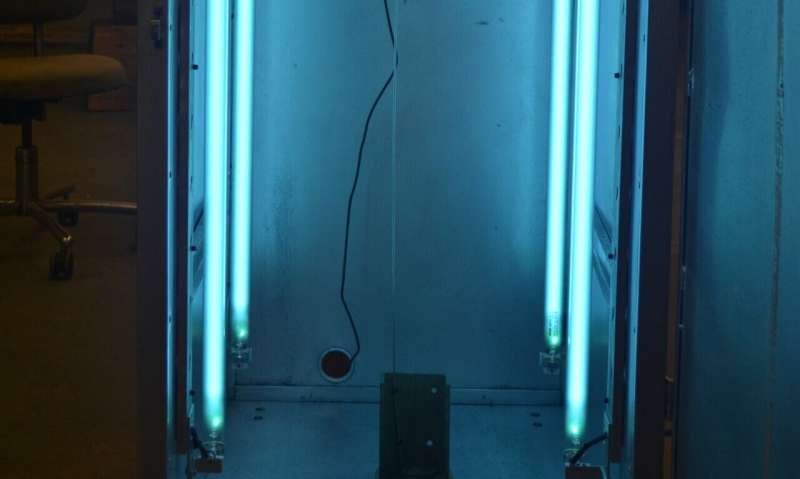Frontline safety: LSU group creates mobile decontamination unit for hospitals to decontaminate masks

In addition to LSU's announcement of large-scale production of personal protective gowns in the Pete Maravich Assembly Center, or PMAC, another group of LSU innovators worked together to develop a solution to a critical challenge facing health care providers in the COVID-19 crisis: how to increase the usability of their limited personal protective equipment, or PPE. To solve that problem, the LSU team developed an ultraviolet light-powered mobile decontamination unit, or MDU, from a food warmer. The tall metal box typically keeps food warm at restaurants, bakeries and other food service providers in their commercial kitchens.
"Reusing PPE that is designed to be disposable goes against every health and safety practice known to those in the medical community. This decontamination unit could provide some peace of mind for those on the front line of this fight," said Michael Hooks, director of LSU's Office of Environmental Health and Safety.
The team, comprising members of LSU's College of Agriculture, College of the Coast & Environment, College of Science, and the Office of Environmental Health and Safety reconfigured the metal box with racks, equipment, electronics and specialized lamps in a specific configuration to generate the energy necessary to deactivate the COVID-19 and other viruses.
"We are adapting that equipment to hold and sanitize PPE masks through the use of ultraviolet, or UVC, light," said Bill Gibson, the coordinator of the Field Services Group for the LSU Coastal Studies Institute. "The ultraviolet light allows medical staff to decontaminate the equipment quickly and effectively before reusing it."
Like the gown production efforts in the PMAC, this project was identified early as a promising product by LSU's COVID-19 Quick Response Team and supported by the Office of Research & Economic Development, or ORED. The prototype unit was built at Gibson's home, with parts and equipment sourced and provisioned by Andrew Cox, director of Financial Operations for ORED. Once parts were delivered and the layout designed, unit production moved to the LSU Coastal Studies Institute's Field Services Group and Louisiana Sea Grant mechanical shops on LSU's campus.
To construct the unit, Gibson reconfigured the structure, fabricated and assembled the electrical parts, and installed the UVC bulbs and sockets inside of a six-and-a-half foot tall food warmer. The warmer belonged to Mark Miller, field support field manager for the LSU College of the Coast & Environment. Miller also added the door to the unit. Chris Cleaver, research specialist in the Field Services Group, fabricated all of the needed parts and created a slide mechanism to enable healthcare workers to easily hang the masks inside for decontamination.
"LSU faculty, staff and students are focusing their great ingenuity, creativity, expertise and stakeholder partnerships to help solve the critical shortage of personal protective gear for our front-line health professionals and patients. This is one shining example of our total commitment to LSU's mission. We are here for the people, industries and State of Louisiana," said LSU Vice President of Research & Economic Development Sam Bentley.
Once Gibson assembled and installed the parts into the unit, it was tested by members of LSU's Office of Environmental Health and Safety.
"Our task was to come up with a testing and use protocol to make sure that it works, and that it is used properly by hospital staff," Hooks said.
Gibson said the concept had been previously proven effective by the University of Nebraska, but said the LSU-created unit is smaller and mobile.
"Following their design and improving on their designs, we took the initial concept and looked for an effective way to adapt it to what we had on hand. We decided to scale the size of it down to allow for this to be set up in a smaller room that would be away from patients and medical staff. The idea was to make it portable and easier to use and setup," Gibson said.
The group plans to manufacture additional units and will start by working with partners at LSU Health New Orleans for early testing and ease of use.
The project, nicknamed the "SaniTiger," was funded by LSU's Office of Research and Economic Development, or ORED. ORED has been helping to fund other COVID-related research and development projects, which have included health care workers' gown production, face shields and hand sanitizer. The LSU-designed MDU has also received the attention of the U.S. Department of Defense. The agency has offered feedback on design and decontamination approaches.




















